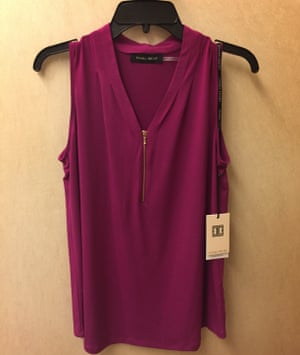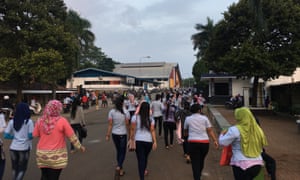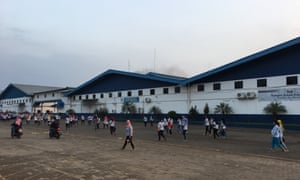イバンカ基金に57億円と言われていることについて外務
^---the guardian 引用ーー
Revealed: reality of life working in an Ivanka Trump clothing factory
明らかにされた:Ivankaトランプ衣類工場で働く人の現実
Workers complain of verbal abuse, impossible targets and ‘poverty pay’ so bad they have to live away from their children
労働者は口での虐待、不倒目標、「低賃金」など子供たちと会えない日々
写真:John Lamparski / Getty Images
Workers at a factory that makes clothes for Ivanka Trump’s fashion label say they get verbally abused Photograph: John Lamparski/Getty Images
イヴァンカのファッションレーベルのための服を作る工場の労働者は
罵声を浴びせられて働いています。。
Krithika Varagur in Subang, West Java
西ジャワ州スバンのKrithika Varagur
The reality of working in a factory making clothes for Ivanka Trump’s label has been laid bare, with employees speaking of being paid so little they cannot live with their children, anti-union intimidation and women being offered a bonus if they don’t take time off while menstruating.
イワンカ・トランプのラベルのための服を作っている工場で働く現実は、
従業員が給与を支払や契約は、
子供と一緒に暮らすことができず、
反組合の脅迫があり、女性は月経中に休みを取らないとボーナスを受け取れるのです。
The Guardian has spoken to more than a dozen workers at the fashion label’s factory in Subang, Indonesia, where employees describe being paid one of the lowest minimum wages in Asia and there are claims of impossibly high production targets and sporadically compensated overtime.
ガーディアンは
インドネシアのスバンにあるファッションレーベルの工場で
十数人の労働者に話しを聞きました。
従業員はアジアで最も低い最低賃金ではたらき、
非常に高い生産目標と時々、残業を求められます。
The workers’ complaints come only a week after labour activists investigating possible abuses at a Chinese factory that makes Ivanka Trump shoes disappeared into police custody.
労働者の苦情で、警察は
イヴァンカ・トランプの靴の中国の工場での労働虐待事件を調査したが
操業停止は1週間しかなかった
The activists’ group claimed they had uncovered a host of violations at the plant including salaries below China’s legal minimum wage, managers verbally abusing workers and “violations of women’s rights”.
活動家のグループは、中国の法的最低賃金以下の給与、労働者を口頭で虐待するマネージャー、「女性の権利侵害」など、工場で多数の違反行為を明らかにしたと主張した。
In the Indonesian factory some of the complaints are similar, although the wages paid to employees in Subang are much lower.
インドネシアの工場では、苦情のいくつかは似ていますが、
スバンの従業員に支払われる賃金はずっと低くなっています。
Here we look at life inside the factory through interviews with workers, all who have asked for their details to be changed to avoid losing their jobs.
ここでは、仕事の喪失を避けるために細部の変更を求めたすべての労働者へのインタビューを通じて工場内の生活を見ています。
“We don’t like Donald Trump’s policies”
「ドナルド・トランプの政策は好きではない」
Alia is nothing if not industrious. She has worked in factories on and off since leaving her provincial high school, through the birth of two children, leading up to her current job making clothes for brands including Ivanka Trump at the PT Buma Apparel Industry factory in Subang, West Java.
アリアは、器用でないなら職はありません。
彼女は地元の高校を離れ、2人の子供の誕生により、
西ジャワ州スバンのPT Bumaアパレル産業工場で
Ivanka Trumpブランドの服を作っています。
Throughout her marriage to her husband, Ahmad, one or both of them has always worked. And yet, says Alia, the couple can never think about clearing their debts. Instead, what she has to show for years of work at PT Buma is two rooms in a dusty boarding house, rented for $30 a month and decorated with dozens of photos of their children because the couple can’t dream of having enough money to have them at home. The children live, instead, with their grandmother, hours away by motorcycle, and see their parents just one weekend a month, when they can afford the gasoline.
彼女の夫アフマド、との結婚生活は、
一方または両方が常に働いています。
Alia夫婦は借金を清算できないのです。
彼女はPT Bumaでの長年仕事してるのに、見せてくれたのは、
月に30ドルで借りて、数十枚の子供たちの写真で飾ったほこりの多い寄宿舎の2部屋です。
その夫婦は自宅にいるほどのお金を持つ夢見ることができないのです。
子供たちは彼らの祖母と暮らしています
オートバイで数時間もかかる所で、
ガソリンを買う余裕があるときに、
彼らの両親を週に1回だけ見ることができます。
Alia makes the legal minimum wage for her job in her province: 2.3 million rupiah, or about $173 a month – but that legal minimum is among the lowest in Indonesia as a whole, and as much as 40% lower than in Chinese factories, another labour source for the Ivanka Trump brand.
Aliaは彼女の州で法的な最低賃金で働いてます。
:230万ルピア(月額約173ドル)ですが、
法的最低額はインドネシア全体で最低であり、
中国工場よりも40%も低いです
Ivanka Trumpブランドの労働供給源。
PT Buma, a Korean-owned garment company started in Indonesia in 1999, is one of the suppliers of G-III Apparel Group, the wholesale manufacturer for prominent fashion brands including Trump’s clothing.
Many Buma workers know who Ivanka Trump is. Alia noticed her labels popping up on the clothes about a year ago.
Ahmad, who also works in the local garment industry and who, like his wife and most of the workers at her PT Buma factory, is an observant Muslim, said: “We don’t like Donald Trump’s policies.”
He had followed news of the so-called Muslim ban on TV this year. “But we’re not in a position to make employment decisions based on our principles,” he said.
When Alia was told the gist of Ivanka Trump’s new book on women in the workplace, she burst out laughing. Her idea of work-life balance, she said, would be if she could see her children more than once a month.
Staff arrive for work at the PT Buma factory in Subang, Indonesia, which makes Ivanka Trump branded clothing. Photograph: Syarifah Nur Aida for the Guardian
There are currently 2,759 workers at Buma, according to the regional manpower office, of which the total unionised workforce is about 200, split between two unions.
For the majority of non-union Buma workers, their job is a run-of-the-mill hardship to be endured. About three-quarters of them are women, many are mothers and several, like Alia, devote almost all their income to children with whom they can’t afford to live.
Sita, 23, is one such worker. She had to drop out of college when her parents got sick, and started working at Buma last year. She told the Guardian that her contract will be terminated soon, after seven months of work.
“That’s one of the company’s ways to cope with extra expenses,” she said. As a contract worker, she will not get any severance. “I can’t stand it any more. I work unpaid overtime every day and still earn just 2.3 million [rupiah] a month. I’m planning to move from Subang, where the minimum wage is too low. But I don’t know where to go yet. I haven’t got any connections.”
But for some the chance of a job and a pay packet – albeit a small one – is cause for some satisfaction.
Eka, a single mother in her 30s with two children, who has spent seven years at Buma, told the Guardian: “I still like my job. It’s not too hard.”
There are 2,759 workers at Buma, according to the regional manpower office. Photograph: Syarifah Nur Aida for the Guardian
And Yuma, a young unmarried woman, said, “I’m glad that I work at Buma now, because my parents are farmers and it’s a tiring job. Here, at least there is air conditioning.”
The workers spoken to appear to typify the average employee making Ivanka Trump clothes in Indonesia. They are not egregiously abused but are in circumstances so far removed from the first daughter’s “women who work”brand that it was impossible for them to imagine a situation where anyone would wear the dresses they were sewing. Ivanka Trump stepped down from running her brand in January, although all products still bear her name on the label.
Women who are permanent employees at the Buma factory do get certain concessions: three months’ paid maternity leave (usually split between six weeks of pregnancy and six weeks post-birth), mandatory federal health insurance and a monthly bonus of $10.50 if they don’t take a day off for menstruation.
These reports of the Buma factory seem largely typical of the other factories in West Java, said Andriko Otang, of Indonesia’s Trade Union Rights Centre. “Using unrealistic production targets to justify unpaid overtime is very common.”
According to a photo of a timetable one worker showed the Guardian, the production targets, broken down for every half hour between 7am and 4pm, are between 58 and 92 garments per period, while the actual numbers produced are recorded as 27 to 40.
“The management is getting smarter: they tap out our ID cards at 4pm so you can’t prove anything,” said Wildan, a 25-year-old male worker.
Seven workers also said they were subject to verbal abuse, being called things like “animals, moron and monkey”. Otang said this, too, was fairly common.
Beyond this, Buma also has a pattern of firing workers right before Ramadan and rehiring them a month later, to avoid paying a “religious holiday bonus”, according to several workers. Indonesian law dictates all workers are owed a holiday bonus according to their religion, which works out to at least a month’s wages or more depending on seniority. In May 2017, there were about 290 people fired before Ramadan, according to Toto Sunarto, a leader of the SPSI union in Subang.
♦“The buck stops with her”
Indonesia has the largest gap among Asian countries between high and low wages for unskilled garment workers, according the International Labor Organisation. None of the workers the Guardian spoke with have ever received performance-based raises, only federally mandated ones – even though some of them have worked at the factory continuously for seven years.
“You have to assess minimum wages in the context of the country itself and, in that context, it’s not a living wage,” said David Welsh, Indonesia and Malaysia director at the Solidarity Center. “Given the disparity in wages across Indonesia, we see a trend whereby factories are migrating increasingly to the lowest wage jurisdictions … whose terms are essentially dictated deliberately by western brands.”
None of the not-already unionised workers who spoke to the Guardian expressed a desire to join one, citing fears of being fired and a general sense that their work wasn’t all that bad. Sita, for instance, said she “voluntarily” worked overtime almost every day because they never met their targets.
“It’s not surprising to me that in a factory like this, you have rank and file workers who are unclear on what their rights are, and what the law says in terms of wages and rights,” said Jim Keady, an American labor rights activist who has worked extensively in Indonesia. “But with these poverty wages — and I would call it that — just because something is legal, doesn’t mean it is moral.
“The buck stops with her,” said Keady, of Ivanka. “It’s her name that’s on the dress. Without her there is no brand.”
Carry Somers, founder of the non-profit Fashion Revolution said: “Ivanka Trump claims to be the ultimate destination for Women Who Work, but this clearly doesn’t extend to the women who work for her in factories around the world.”
In March, Indonesia was called out by President Donald Trump for having an unfavourable trade balance with the US. The president took issue with Indonesia’s $13bn surplus last year and vowed to penalise “cheating foreign importers”.
The fortunes of Ivanka’s brand have fluctuated wildly in the past year. During her father’s campaign, net sales for her brand increased by almost $18m in the year ending 31 January 2017, according to G-III data. But in recent months, several department stores have pulled her brand and G-III discreetly relabelled some Ivanka Trump merchandise under a different house brand, Adrienne Vitadini.
 Ivanka Trump clothing made in Indonesia. Photograph: Supplied for the Guardian
Ivanka Trump clothing made in Indonesia. Photograph: Supplied for the Guardian
Hepi Abdulmanaf, an official with the local manpower ministry, was flattered by the Trump connection. “It’s proof that Indonesian goods are good enough for the world. Hopefully this – quality garments – becomes something Indonesia is known for.”
Meanwhile, the word “minus” was a common refrain among Buma workers, denoting ongoing debt. “We can never think about leaving debt,” said Alia. The cost of infant formula, school books, or a family visit can put these workers over the edge in any given month.
Fadli, a young man who works in the warehouse part of the factory, sees all the brands’ price tags as they are prepared for shipment to the United States.
“Sure I’m proud to make clothes for a well-known brand,” he said. “But because I see the price tags, I have to wonder, can’t they pay us a bit more?”
The Guardian contacted PT Buma for comment on the claims made in this article. A spokeswoman said neither she, nor anyone else at Buma Jakarta, nor anyone else at Buma Subang, wanted to comment.
G-III Apparel, which became the exclusive supplier of Ivanka Trump’s brand in 2012 told the Guardian in a statement: “G-III Apparel Group, Ltd. is committed to legal compliance and ethical business practices in all of our operations worldwide; we expect and require the same of our business partners throughout the world. We audit and inspect our vendor’s production facilities and when issues arise we work with our partners to correct them promptly.”
The Guardian also approached the White House for comment. None was forthcoming at time of publication. The Ivanka Trump brand’s public relations company declined to offer any comment.
続く☛https://www.theguardian.com/us-news/2017/jun/13/revealed-reality-of-a-life-working-in-an-ivanka-trump-clothing-factory?CMP=share_btn_tw
ーーーend--^
最後まで読んでくれてありがとう(*^-^*) ポチッとよろしく 
人気ブログランキング
follow Hikaru on facebook ☞Hikaru FB Timeline
and twitter ☞ヒカル(反原発)
楽しく明るく暮らせるように繋がりませんか? ☞小さな蟻の会
(*一部省略しています。誤字・脱字・変換ミス等はご容赦ください。)




